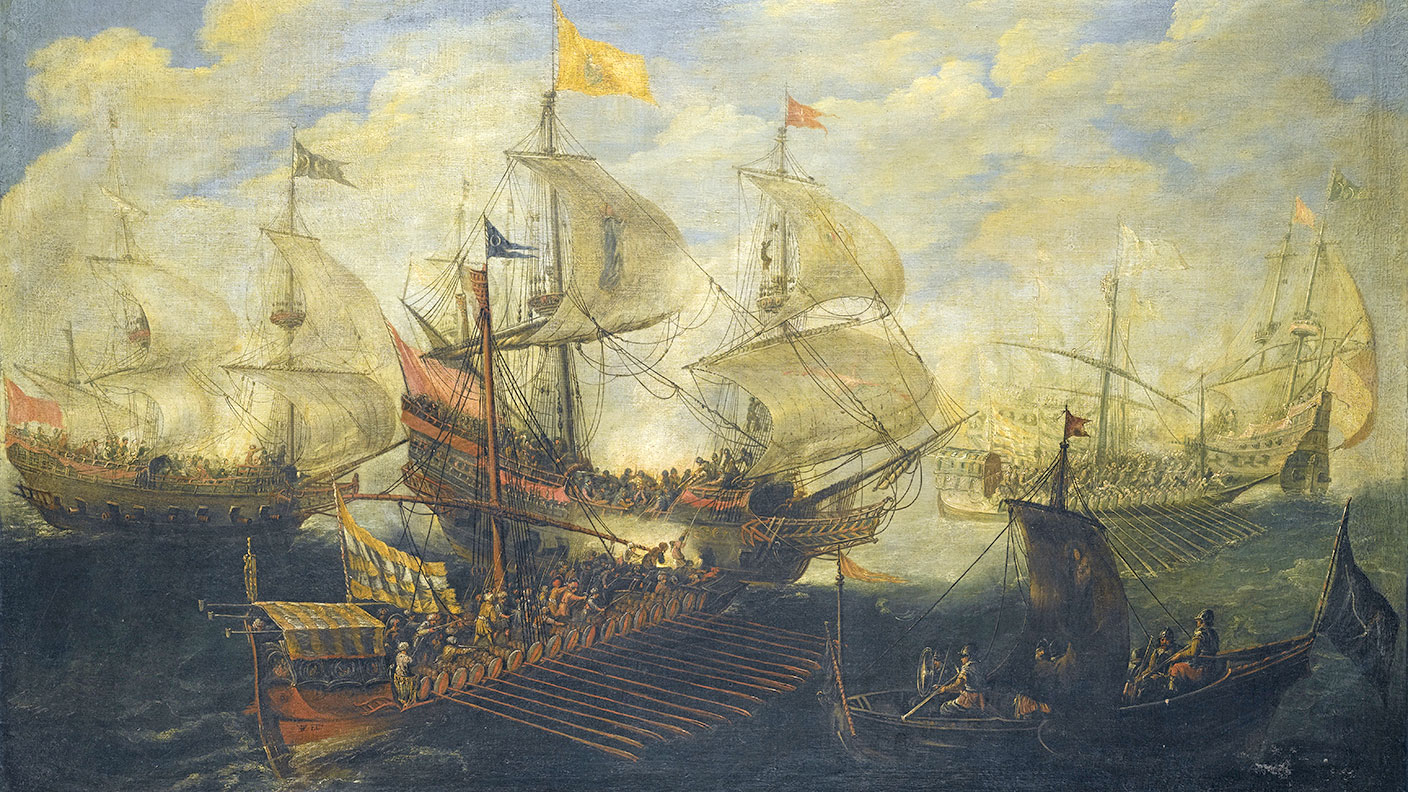7 October 1571: The Battle of Lepanto halts Ottoman expansion
On this day in 1571, the ‘Holy Fleet’ of Pope Pius V defeated the larger but less well armed Ottoman navy, precipitating the decline of the Ottoman empire.


Get the latest financial news, insights and expert analysis from our award-winning MoneyWeek team, to help you understand what really matters when it comes to your finances.
You are now subscribed
Your newsletter sign-up was successful
Want to add more newsletters?

Twice daily
MoneyWeek
Get the latest financial news, insights and expert analysis from our award-winning MoneyWeek team, to help you understand what really matters when it comes to your finances.

Four times a week
Look After My Bills
Sign up to our free money-saving newsletter, filled with the latest news and expert advice to help you find the best tips and deals for managing your bills. Start saving today!
In 1571, Famagusta was surrounded. One by one, the other Venetian colonies on the island of Cyprus had fallen to the conquering Turkish army. But Cyprus was just the latest in a long line of triumphs stretching back almost a century.
The Ottoman Empire had grown wealthy controlling the eastern trade routes. To the west, it had taken advantage of the squabbling kingdoms to overrun Greece and the Balkans. At the same time, its navy had swelled. Now, the empire looked all but unstoppable.
Pope Pius V decided something had to be done. With help from the Spanish, he assembled a large fleet with the Venetians and other Italian and Papal states. John of Austria, the half-brother of the king of Spain, was chosen to lead the Holy League fleet, which left Sicily and headed east.
MoneyWeek
Subscribe to MoneyWeek today and get your first six magazine issues absolutely FREE

Sign up to Money Morning
Don't miss the latest investment and personal finances news, market analysis, plus money-saving tips with our free twice-daily newsletter
Don't miss the latest investment and personal finances news, market analysis, plus money-saving tips with our free twice-daily newsletter
On 7 October, the two navies clashed in the Gulf of Corinth. It was to be the last major battle fought between galleys rowing ships used since antiquity in the Mediterranean.
Although they were outnumbered, the Venetians had an ace up their sleeves: the galleass. This was a larger version of the galley; but what made it really stand out was its cannon. In addition to this, the Spanish troops were armed with arquebuses, a sort of musket.
Despite relying on their elite Janissaries and composite bowmen, the Ottoman soldiers still made for formidable foes.
After four hours of fighting, the Turkish fleet lay in tatters. But while the defeat came as a shock to the Ottomans, the setback was only temporary. The Ottomans took possession of Cyprus following negotiations with Venice in 1573.
But the psychological impact was longer lasting. The European kingdoms felt emboldened by the decisive victory at sea, and for many historians, the Battle of Lepanto marks the beginning of the long, slow decline of the Ottoman Empire.
Get the latest financial news, insights and expert analysis from our award-winning MoneyWeek team, to help you understand what really matters when it comes to your finances.

-
 ISA fund and trust picks for every type of investor – which could work for you?
ISA fund and trust picks for every type of investor – which could work for you?Whether you’re an ISA investor seeking reliable returns, looking to add a bit more risk to your portfolio or are new to investing, MoneyWeek asked the experts for funds and investment trusts you could consider in 2026
-
 The most popular fund sectors of 2025 as investor outflows continue
The most popular fund sectors of 2025 as investor outflows continueIt was another difficult year for fund inflows but there are signs that investors are returning to the financial markets
-
 31 August 1957: the Federation of Malaya declares independence from the UK
31 August 1957: the Federation of Malaya declares independence from the UKFeatures On this day in 1957, after ten years of preparation, the Federation of Malaya became an independent nation.
-
 13 April 1960: the first satellite navigation system is launched
13 April 1960: the first satellite navigation system is launchedFeatures On this day in 1960, Nasa sent the Transit 1B satellite into orbit to provide positioning for the US Navy’s fleet of Polaris ballistic missile submarines.
-
 9 April 1838: National Gallery opens in Trafalgar Square
9 April 1838: National Gallery opens in Trafalgar SquareFeatures On this day in 1838, William Wilkins’ new National Gallery building in Trafalgar Square opened to the public.
-
3 March 1962: British Antarctic Territory is created
Features On this day in 1962, Britain formed the British Antarctic Territory administered from the Falkland Islands.
-
10 March 2000: the dotcom bubble peaks
Features Tech mania fanned by the dawning of the internet age inflated the dotcom bubble to maximum extent, on this day in 2000.
-
9 March 1776: Adam Smith publishes 'The Wealth of Nations'
Features On this day in 1776, Adam Smith, the “father of modern economics”, published his hugely influential book The Wealth of Nations.
-
 8 March 1817: the New York Stock Exchange is formed
8 March 1817: the New York Stock Exchange is formedFeatures On this day in 1817, a group of brokers moved out of a New York coffee house to form what would become the biggest stock exchange in the world.
-
7 March 1969: Queen Elizabeth II officially opens the Victoria Line
Features On this day in 1969, Queen Elizabeth II took only her second trip on the tube to officially open the underground’s newest line – the Victoria Line.